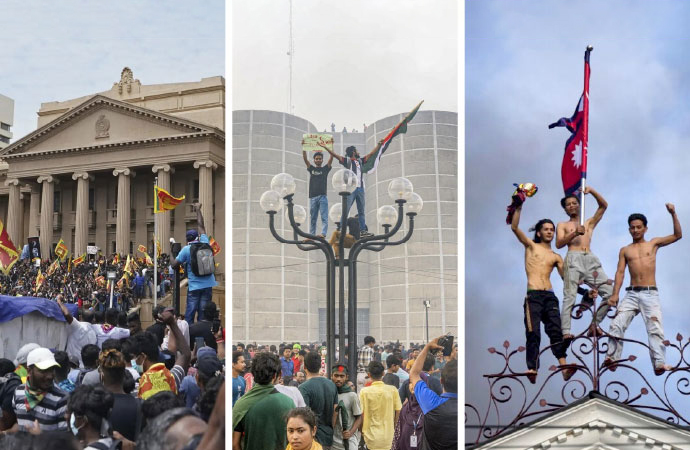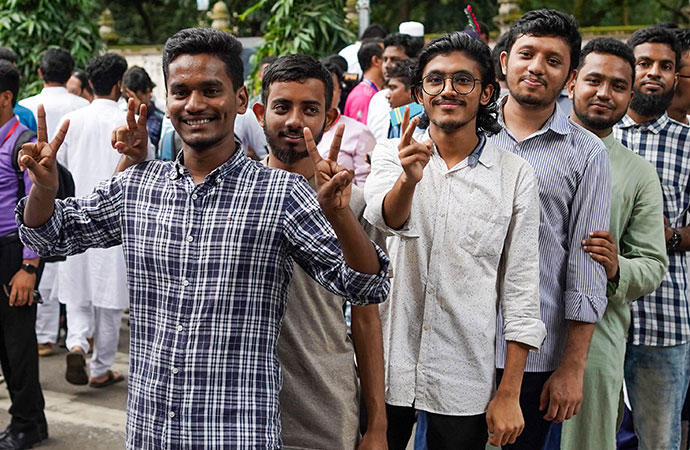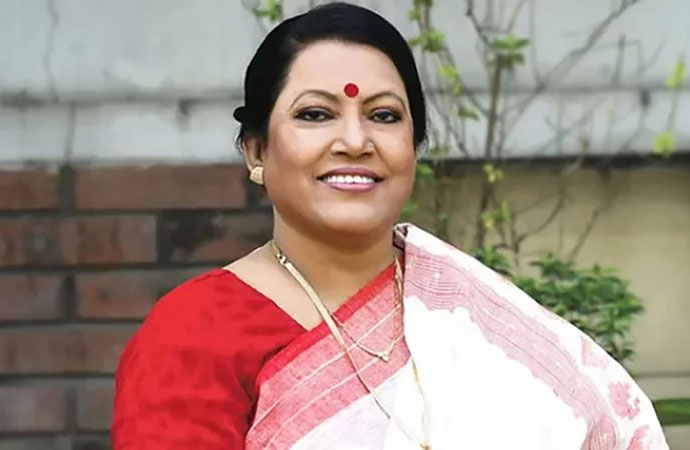Column

Photo: AP
Two weeks ago, I wrote a column in these pages using the term "Banglanesia" to metaphorically describe the connections between the Bangladesh uprising of 2024 and the Indonesian one of 2025. This column uses the term "Sribanglapal" to suggest a further continuity, that between Sri Lanka, Bangladesh and Nepal (but not Indonesia), Nepal being the latest country in South Asia where mass protests have resulted in the violent overthrow of the existing system after Sri Lanka in 2022 and Bangladesh last year. "Sribanglapal" is of course a neologism that I am coining, but it sounds so Bengali, almost like the name of a newborn.
In all three South Asian countries, serving leaders have fallen from power in the face of a gathering confluence of events: an accumulation of economic and political grievances which a catalytic event galvanised into youth mobilisation that was met with a high-handed security crackdown which failed to contain a crisis that first shook and then broke a regime. (Indonesia is different. The regime is shaken but by no means broken; indeed, it is busy re-consolidating itself.) In South Asia, "Sribanglapal" more or less aptly signifies how apparently unshakeable regimes suddenly find themselves at the receiving end of history. The point held in common among Sri Lanka, Bangladesh and Nepal is this: Ancient geriatric power is not and cannot be immune to the eternal youthfulness of change. Ageing elites must recognise and stand aside - or fall.
Why do they not recognise obvious truths? After all, elites do not consist of stupid people. Those people rose to power by surviving ritual treachery by political rivals and ideological betrayal by fellow-travellers. Indeed, they did the same themselves: They were treacherous when they had the opportunity to do so. They, too, betrayed those who had placed political trust in them. Then why cannot elites stay in power by mastering the art of surviving change?
The reason is summed up in one phrase: the illusion of entitlement. To land a ministerial berth, to say nothing of the presidential or the prime ministerial one, is to have arrived. Arrival means being surrounded by eager yes-men, servile courtiers, anxious flatterers, smiling time-servers, pretend friends and so on. That unholy crowd sustains the arrogant illusion of entitled arrival in the elite, the makebelieve of political immortality. To have arrived also means believing that the arrival is permanent. Politicians turn themselves into gods and goddesses. Then, the real gods begin to play the politics of revenge with them. The elite falls, either individually or collectively. An individual fall involves a Cabinet change. The collective fall is called regime change.
Nepal
As in the rest of Sribanglapal, the Nepalese revolution involved both proximate and fundamental factors. The proximate reason in Sri Lanka was an acute economic crisis that excavated the fundamental, systemic abuse of political power to enrich the ruling elite. In Bangladesh, the anti-discrimination movement seized on outrageous public-sector job quotas to reveal the broader picture of how a partisan elite had gamed the entire national system to its electoral advantage. In Nepal, the official crackdown on social media was seen as an attack on the freedom of expression that had allowed citizens to protest against "nepokids", the children of the political elite who flaunted their wealth and status in a country that faced both an economic and a political deficit. As in Bangladesh, the police killing of unarmed demonstrators tipped the scales in favour of popular violence in Nepal. What followed was mayhem that exceeded the original provocation. Violence was directed not only at political individuals and their personal and corporate property, but at emblems of a state that had been discredited by vicious governance. Sadly, the Parliament and Supreme Court buildings were set on fire in Kathmandu although they belonged to the people and not the regime. Why? Because furious people associated the institutions of state with the longevity of politicians. The occupation of the President's House in Colombo and the sacking of Gonobhaban in Dhaka were symbolic precursors to the fire that arrived in Parliament in Kathmandu.
Looking ahead, it appears that Nepal will roughly follow the trajectory of Sri Lanka and Bangladesh in searching for a new regime untainted by association with a despised immediate past. In Sri Lanka, the Anura Kumara Dissanayake presidency marks a sharp departure from the Rajapaksa family era and ends, at least for the time being, the dynastic politics that brought the country to its economic knees. In Bangladesh, the interim government is negotiating its way between the legacy of the Awami League and a future that will be determined by elections next year.
An interesting connection between the two countries is the rejection of dynastic politics. Sri Lanka witnessed the alternating dynasties of the Bandaranaikes and the Rajapaksas, Bangladesh the rotational rule of the two Rahman families. Sri Lankans have settled for Dissanayake, the leader of the formerly violently Marxist Janatha Vimukthi Peramuna which has now reinforced its credentials as a staunchly Sinhala Buddhist party not particularly enamoured of the rights of the minority Tamils. Will Bangladeshis go the same way in February next year by embracing the Jamaat-e-Islami which, its predecessor's opposition to Bangladesh's independence notwithstanding, has reinvented itself as a nationalist party with the best Islamic credentials? The overwhelming victory of the Islamic Shibir, Jamaat's students' wing, in elections at Dhaka University may show what lies ahead. After all, the Dhaka University Central Students' Union is considered to be the second parliament of Bangladesh.
Nepal faces a challenge in this regard. It abolished the monarchy and declared itself a secular republic in 2008. Its parliamentary process since then threw up a range of political parties, most of whose national pretentions were literally reduced to ashes during the last uprising. What had emerged even earlier was the resurgence of anti-republican sentiments that called for the return of the monarchy and the re-establishment of Hinduism as the state religion. What remains to be seen is whether Nepal will go the way of Sri Lanka and possibly Bangladesh in redefining its identity in more clearly-articulated ethnic terms.
Sribanglapal is just an acronym. Sri Lanka, Bangladesh and Nepal are realities.
The writer is Principal Research Fellow of the Cosmos Foundation. He may be reached at epaaropaar@gmail.com

























Leave a Comment
Recent Posts
Religion and Politics: A Toxic ...
At Dhaka University, cafeteria workers have been told not to wear shor ...
Enayetullah Khan joins AsiaNet ...
AsiaNet’s annual board meeting and forum was held in Singapore, ...
In a New York minute
Many leaders back a UN call to address challenges to ..
Defaulted loans at Non-Bank Financial Institutions ( ..
How the late Zubeen Garg embodied cultural affinitie ..